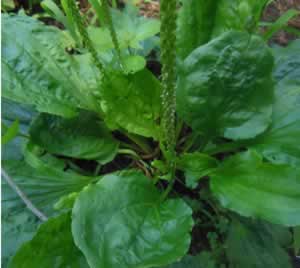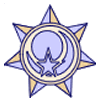Plantain Plantago major ,lanceolata L.

Plantain
- Common Names
- Plantain , Broad-leaved Plantain, Ribwort, narrow leaved plantain, Slan-lus
- Botanical Name
- Plantago major ,lanceolata L.
- Family
- PLANTAGINACEAE
Medicinal Uses & Benefits of Plantain
![]() How to Use|
Side Effects |
Plant & Garden|
Folklore
How to Use|
Side Effects |
Plant & Garden|
Folklore
- Medicinal Uses: * Burns
* Cuts & Wounds
* Insect/flea Bites
* Sore Throat
- Properties: * Anodyne * Astringent * Depurative * Diuretic * Refrigerant * Refrigerant * Styptic * Vulnerary
- Parts Used: root, leaves, flowers
- Constituents: allantoin, apigenin,ascorbic-acid,aucubin,caffeic-acid, cinnamic-acid,citric-acid, mucilage, luteolin,oleanolic-acid,p-coumaric-acid, salicylic-acid,tannin,ursolic-acid,vanillic-acid
How to Use: Plantain
Preparation Methods & Dosage :Mainly used in poultices and salves. Can be brewed into a tea as well. You can juice the fresh plant in the blender by adding warm water to finely chopped leaves This will result in a gooey, dark-green soup. Store in a cold refrigerator for up to two weeks.
Plantain Remedies
Plant Description
Plantain is useful plant overlooked by many because of its abundance and reputation as a weed. You have probably seen it growing in the cracks of sidewalks, or the middle of your driveway. It is a good source of vitamins C, A, and K. Over two hundred species of plantain grow throughout the world, the two most common to North American are P. major, the broad-leaved or common plantain, and P. lanceolata, the narrow-leaved plantain, (ribwort).
Related Species Plantago psyllium is know for its seeds and husk which are a good source of dietary fiber and are used as an effective laxative.
History and Traditions & Folklore
The American Indian used the abundant plant as the chief remedy for the bite of the rattlesnake, and called it "snakeweed" after this use.Our Saxon ancestors esteemed plantain highly and in the old Lacnunga (a collection of miscellaneous medical texts,Lacnunga means 'remedies' in Old English) the Weybroed (plantain) is mentioned as one of nine sacred herbs.
 It is true, Misaldus and others, yea, almost all astrology-physicians, hold this to be an herb of Mars, because it cures the diseases of the head and privities, which are under the houses of Mars, Aries, and Scorpio. The truth is, it is under the command of Venus, and cures the head by antipathy to Mars, and the privities by sympathy to Venus; neither is there hardly a martial disease but it cures.
It is true, Misaldus and others, yea, almost all astrology-physicians, hold this to be an herb of Mars, because it cures the diseases of the head and privities, which are under the houses of Mars, Aries, and Scorpio. The truth is, it is under the command of Venus, and cures the head by antipathy to Mars, and the privities by sympathy to Venus; neither is there hardly a martial disease but it cures.
Nicholas Culpeper, 1653












